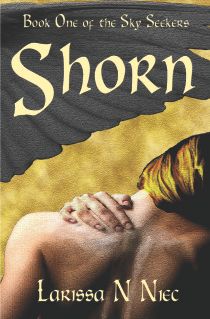Author Spotlight: Larissa Niec Author of Shorn
Today’s author spotlight is turned on Larissa Niec. Larissa is the author of Shorn, the first of the Sky Seeker’s series.


Jhared Denaban, a young soldier of the land of Avelos, lives under the Avelune Curse because he descended from a tribe that betrayed their land and earned themselves the label of Shorn. As Jhared labors under the strict laws forbidding the Shorn to hold public office or enter the priesthood, he discovers that Avelos faces not only enemies from without but also rivalries and deceit from within, and he suspects that the stories of his ancestors' shame may not be totally accurate. Niec's debut novel, the first of a planned four-book series, creates a fascinating world of rival clans and sacred rituals, tainted by a dark, shameful past and subject to predation from its enemies.
Shorn will be followed next spring by its sequel novel, Cael’s Shadow.
Larissa said that she got the idea for Shorn from a dream.
“Here’s a fantastic lesson for anyone interested in writing fiction: pay attention to your dreams,” Larissa said. “You never know when your next story will appear there! When I dreamed of Jhared, I knew his was a story that must be told.”
Larissa said that she turns to fiction writing as a way to relax from her day job working with children.
“I’m a clinical child psychologist and a professor of psychology. I teach undergraduate and grad students, and I run a clinic for children with serious emotional disorders. I’m so lucky: I’m not sure a lot of people can honestly say they love their job. And I have two jobs that I love.”
Larissa said that writing is a way to explore human nature.
“I view fantasy as an exploration of all the aspects of what societies and individuals can be. My goal is to create deeply human characters defined and constrained by rituals and taboos that are different from our own, but still based on the same desires, wishes, and needs that have shaped us throughout the ages.”
On her website, Larissa discusses the stereotypes of mental illnesses portrayed in literature.
Larissa writes in her blog that: “Many stereotypes about people who experience mental illness show up repeatedly in literature and film. How many times, for example, is madness used to explain an antagonist’s cruelty? Using clichés and stereotypes is not only lazy writing, but can perpetuate harmful and inaccurate perceptions.”
In order to counteract these inaccurate perceptions and portray mental illness in a sensitive way, she suggests that writers who wish to portray mental illness read extensively on the subject to develop an understanding of the illness before writing about it. Good sources for research include abnormal psychology texts and scholarly articles as well as personal memoirs written by people who have suffered from mental illness.
She also advises that the writer portray mental illness in a manner consistent with the culture and time that the writer is seeking to portray.
“Societies have drastically different responses to mental illness. They differ in their concepts of 1) the causes of mental illness, 2) the symptoms of mental illness, and 3) the treatment of people who experience mental illness. Think about the world you’re creating and the attitudes people have toward those who are different. Be careful not to use modern Western attitudes by default.”
Larissa writes that certain cultures have mental illnesses that are specific to that culture and do not appear outside that culture.
“For example, among cultures with strong beliefs about the powers of the dead, some mental distress is believed to be caused by associating with ghosts. In polar climates, there are specific phobias of being lost in the snow and hypothermia that you don’t see in tropical areas.”
Larissa said that she has no author appearances planned until she can complete Cael’s Shadow, but she plans to attend WisCon, ReaderCon and Fae Escape in Atlanta.
You can find her on the web at www.larissaNiec.com
Larissa also maintains a blog at http://larissaniec.com/main/ and a facebook page at http://www.facebook.com/home.php#!/larissa.niec


Jhared Denaban, a young soldier of the land of Avelos, lives under the Avelune Curse because he descended from a tribe that betrayed their land and earned themselves the label of Shorn. As Jhared labors under the strict laws forbidding the Shorn to hold public office or enter the priesthood, he discovers that Avelos faces not only enemies from without but also rivalries and deceit from within, and he suspects that the stories of his ancestors' shame may not be totally accurate. Niec's debut novel, the first of a planned four-book series, creates a fascinating world of rival clans and sacred rituals, tainted by a dark, shameful past and subject to predation from its enemies.
Shorn will be followed next spring by its sequel novel, Cael’s Shadow.
Larissa said that she got the idea for Shorn from a dream.
“Here’s a fantastic lesson for anyone interested in writing fiction: pay attention to your dreams,” Larissa said. “You never know when your next story will appear there! When I dreamed of Jhared, I knew his was a story that must be told.”
Larissa said that she turns to fiction writing as a way to relax from her day job working with children.
“I’m a clinical child psychologist and a professor of psychology. I teach undergraduate and grad students, and I run a clinic for children with serious emotional disorders. I’m so lucky: I’m not sure a lot of people can honestly say they love their job. And I have two jobs that I love.”
Larissa said that writing is a way to explore human nature.
“I view fantasy as an exploration of all the aspects of what societies and individuals can be. My goal is to create deeply human characters defined and constrained by rituals and taboos that are different from our own, but still based on the same desires, wishes, and needs that have shaped us throughout the ages.”
On her website, Larissa discusses the stereotypes of mental illnesses portrayed in literature.
Larissa writes in her blog that: “Many stereotypes about people who experience mental illness show up repeatedly in literature and film. How many times, for example, is madness used to explain an antagonist’s cruelty? Using clichés and stereotypes is not only lazy writing, but can perpetuate harmful and inaccurate perceptions.”
In order to counteract these inaccurate perceptions and portray mental illness in a sensitive way, she suggests that writers who wish to portray mental illness read extensively on the subject to develop an understanding of the illness before writing about it. Good sources for research include abnormal psychology texts and scholarly articles as well as personal memoirs written by people who have suffered from mental illness.
She also advises that the writer portray mental illness in a manner consistent with the culture and time that the writer is seeking to portray.
“Societies have drastically different responses to mental illness. They differ in their concepts of 1) the causes of mental illness, 2) the symptoms of mental illness, and 3) the treatment of people who experience mental illness. Think about the world you’re creating and the attitudes people have toward those who are different. Be careful not to use modern Western attitudes by default.”
Larissa writes that certain cultures have mental illnesses that are specific to that culture and do not appear outside that culture.
“For example, among cultures with strong beliefs about the powers of the dead, some mental distress is believed to be caused by associating with ghosts. In polar climates, there are specific phobias of being lost in the snow and hypothermia that you don’t see in tropical areas.”
Larissa said that she has no author appearances planned until she can complete Cael’s Shadow, but she plans to attend WisCon, ReaderCon and Fae Escape in Atlanta.
You can find her on the web at www.larissaNiec.com
Larissa also maintains a blog at http://larissaniec.com/main/ and a facebook page at http://www.facebook.com/home.php#!/larissa.niec